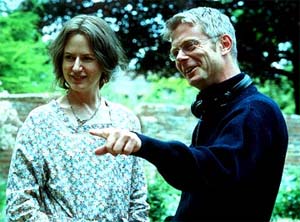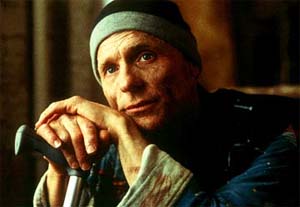
|
1951, Los Angeles, and Laura Brown (Julianne Moore) awakens to her beloved new read, Mrs. Dalloway. It seems to comfort her and her surroundings of being a housewife to stable-normal-life lover and war vet husband (John C. Reilly) and their youngster (played magnificently by Jack Rovello). Laura's and Woolf's misery are somewhat side swept as Mrs. Dalloway enters the scene, and when she leaves, their tribulation beckons them to a wanting of something more in life then what is obviously unavoidable. It is clear that Woolf and Laura have bisexual feelings, Laura expressing these feelings towards her neighbor (Toni Collette) in a very moving and masterful sequence. Clarissa (Meryl Streep) is a lesbian and living with her partner in modern-day New York. And just as Mrs. Dalloway haunts Woolf and Laura, Clarissa is in many ways a manifestation of the fictional character. She is even nicknamed Mrs. Dalloway by her ex lover, Richard (Ed Harris), who is dying of AIDS and who she is throwing a party for. The Hours is a sprawling and enormously involving film of surprising power and humane sadness. Kidman, Moore, and Streep all give superb performances in their worlds of unease, Streep coming on top and proving once again she is probably the greatest actress of the sound era. Her Clarissa is complex, though not as enigmatic as Woolf or as uneven in her emotions as Laura.
What's important about The Hours is it doesn't force reasons on why these women do the things they do. The answers are brought on by revelations instead of inexplicable graphic detail a lesser film might have thrown out at the last minute. Why Virginia Woolf commits suicide by drowning herself in a river in 1941 is pretty clear from a scene at a train station where she confronts her husband about her suffocation in the small picturesque Sussex. Laura is the embodiment of many homemakers from the '50s who felt their lives as mother and wife demeaned their time on earth. Much like Moore's Cathy Whitaker from the wonderful Far From Heaven, Laura is overwhelmed by the enclosing and dominated suburban America way of life. A dream Laura has is evident of this. To say The Hours is about suicide is missing the point. The film is about the turbulent times these women were flooded with, some overcoming the tragedies, some not, and the bond that chained them together. Two of the main characters meet-although I will not say which-and their conversation together is one of the major elements of the movie. While some of the women were forced into a life they did not want, some overcame the obstacles and found love and a possibility of happiness. The Hours was just nominated for nine Oscars, including Best Picture and Supporting Actor and Actress for Ed Harris and Julianne Moore. The film really deserves this recognition for it is a far more important and intense movie experience than Gangs of New York or The Lord of the Rings. A fine character study, The Hours pours on the impending feeling of discomfort as the women become more entangled in a web of desolation and your feelings towards them deepens. |
|
 Actress Nicole Kidman and Director Stephen Daldry were both nominated for Oscars for their work in The Hours
Actress Nicole Kidman and Director Stephen Daldry were both nominated for Oscars for their work in The Hours Ed Harris also garnered an Oscar nomination for The Hours
Ed Harris also garnered an Oscar nomination for The Hours